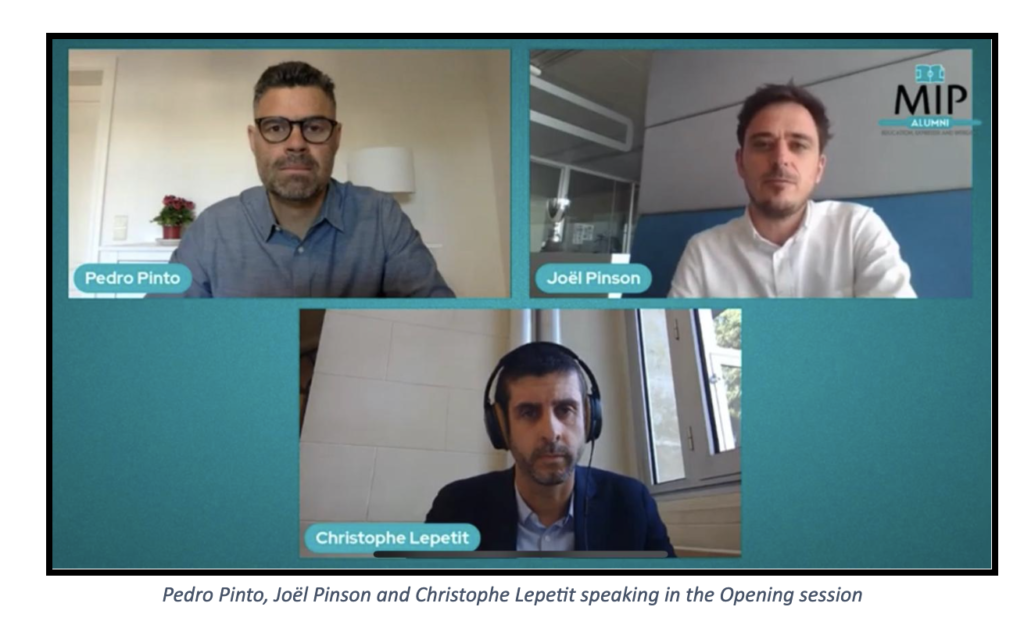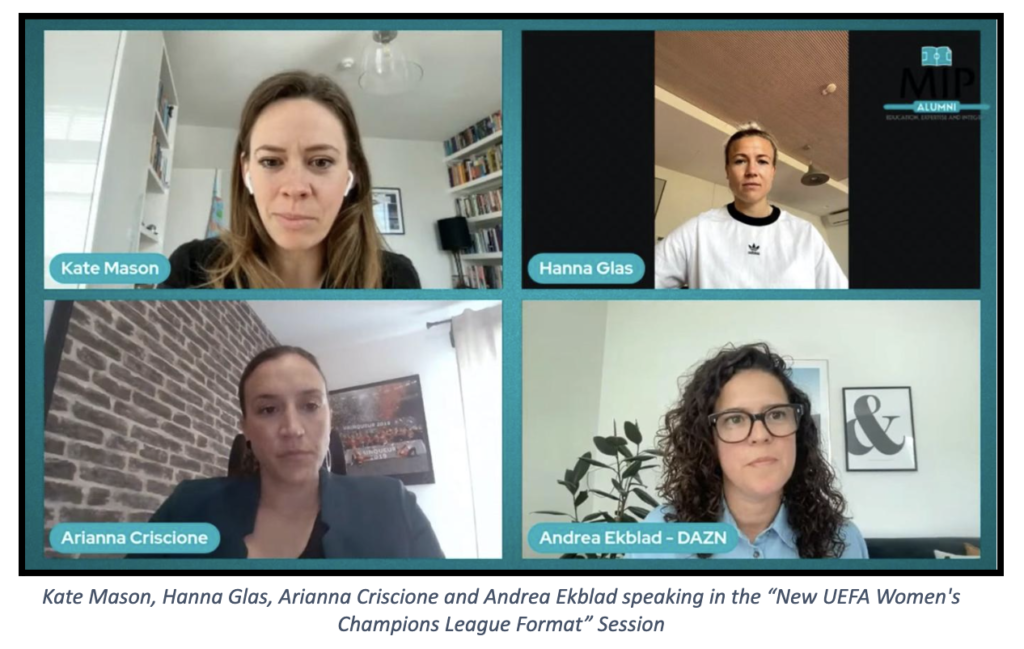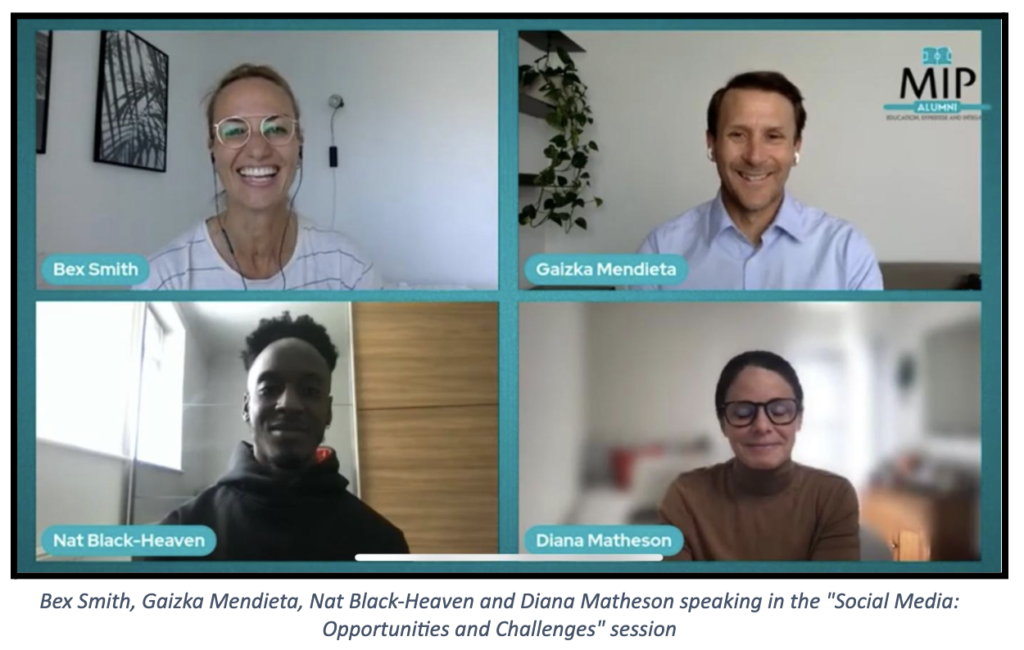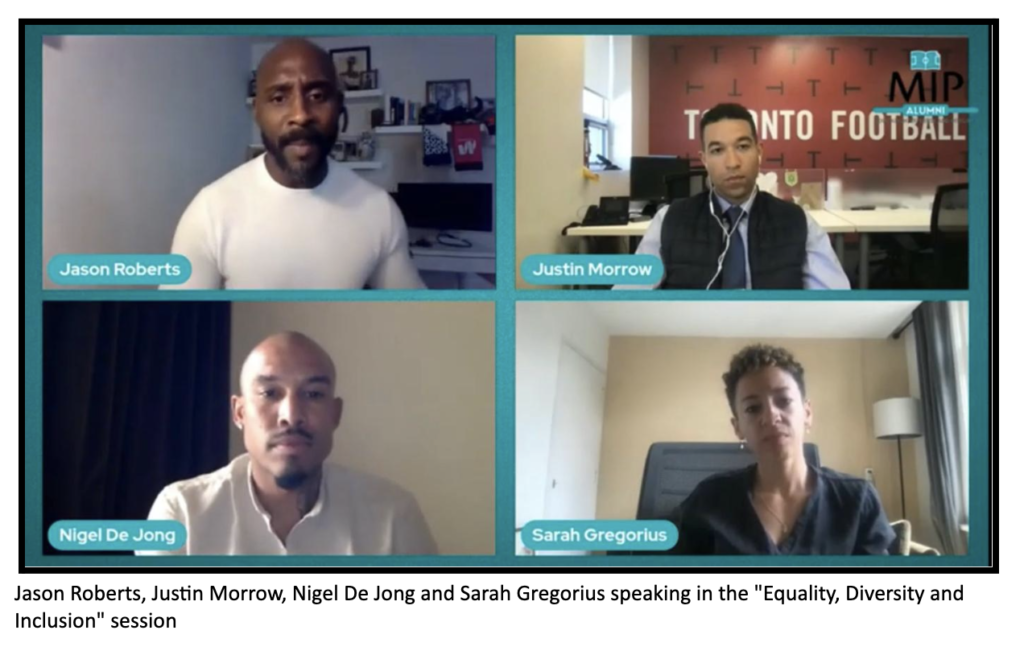2022 MIP Alumni Association Conference
“Change is like a tree, it starts at the roots.”
The second annual MIP Alumni Conference took place virtually on Monday May 9, 2022, once again bringing together the international community of UEFA MIP Alumni, thought-leaders and executives from a range of organisations to explore the challenges and opportunities for football professionals across the industry to develop and enrich the game. Throughout the conference, alumni and guest speakers shared expert knowledge, insights and advice aimed at players reaching the end of their athletic career or those who have recently retired in forging a new career for themselves in the modern football environment. Prominent topics were explored on the day including leadership, the women’s game, player welfare, social media and diversity and inclusion. This summary presents the key themes, ideas and considerations that emerged from the conference.
Intro (Opening Session)
In keeping with the MIP Alumni Association’s values of integrity, education and expertise, President Bruno Cheyrou, spoke of the organisation as part of the shared responsibility of former players, managers and referees to give back to football. He said, “This is a way to spread out our expertise and what we learned on the pitch. Thanks to UEFA and CDES they have created this programme for former players and with the tools they have provided we can spread out the good message.
“We want to be part of the global stakeholders. We want to give back to football in a general way not only to the players, not only to the clubs, not only to the federations – we want to give back to football.”
Whilst the MIP course is supported by world-class academic institutions across Europe, Joël Pinson, UEFA Academy Programme Specialist, emphasised that it is “not only an education programme just for two years, there is a legacy beyond it.
“The network that we create around it is really important and to see that now we have people with key positions in football is really important and will only grow in the future.”
1. Trust that your playing career will help you in your new one.
Beyond their athletic abilities, professional players have cultivated valuable skills which can be used to advance the football community and its associations in a myriad of ways. The MIP programme aims to identify and nourish these skills through innovative learning methods and help turn elite players into leaders off the pitch.
Lise Klaveness recalled how her playing career helped in her corporate career as a lawyer and then when she became Technical Director of the Norwegian Football Federation. She is now President of the NFF, the first woman in its history. “I had to transfer my playing background to be useful and after a year I felt it was one of my biggest strengths.
“To get back into the game when you have played bad, I had all kinds of metaphors from my career that I used.”
Former Brazil international now Chief of Football Development at UEFA, Maxwell, said players often don’t realise how many attributes they have already gleaned from their time as players such as “communication, being under pressure and knowing how to make decisions under pressure.”
Speaking on advice he would give to players looking to make their transition Kaspars Gorkšs said, “Ask questions and find mentors that will help lead you into your administrative career. Nothing will be as much fun as to play football on the pitch but it helps to shorten the time between being on the pitch and entering a new role.”
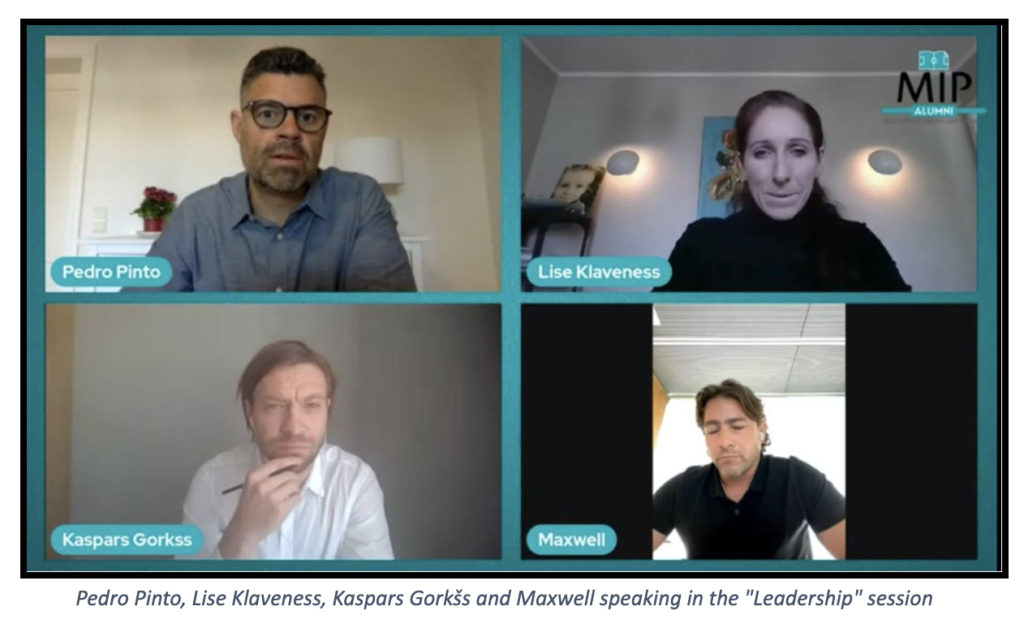
2. Forging an identity beyond football.
Fewer than 1% of players will make it as a professional footballer at any level of the game. The subsequent majority are released having known nothing but football their entire lives. This oftentimes creates a chasm in their identity leading to a variety of welfare issues. For the ones that do make it, there is a great amount of pressure placed on them both physically and mentally.
Former Germany international and Head of Arsenal Academy, Per Mertesacker, described the weight of expectation he felt during his playing career, “The burden of football is increasingly higher.
“Sometimes being injured would be a relief for me because I would be able to step away from the scrutiny. Playing the game at the highest level, everyone feels some form of pressure to deliver. There’s an acceptance of that.”
This sentiment was echoed by Dr Michael Bennett, Director of Player Welfare at the PFA who said, “I had to wear a mask and be what football wanted me to be and wasn’t able to be myself because I wasn’t able to articulate how I was feeling with anybody. So with the work I do now with players I recognise the importance of players having the opportunity to speak to someone in a private and confidential setting to deal with the emotional side of the game.”
Central to the discussion was the idea that players need to be given the space to form an identity outside of football. Manisha Tailor, Assistant Head of Coaching at QPR FC said, “We need to try as much as possible to ensure that the curriculum that players receive is beyond football. Our job is to make sure when they come through the door they develop as human beings and have a rounded diet of learning because very few are going to make it as players.
“Let’s put them on a journey so that they’re already thinking about their identity which is beyond them being identified by a particular club which can become a bit dangerous psychologically.”
Christian Luthardt, sports psychologist at FC Bayern Munich, further added, “We talk with people involved in all aspects of youth development about mental health but not only in a sense of preventing and detecting mental health issues but promoting a culture of wellbeing where the player feels appreciated not just in his performance but as a human being.”
3. The growing women’s game.
Women’s football is more popular than ever, with the sport currently seeing unprecedented levels of exposure, sponsorship, viewership and attendances. Arianna Criscione, former Paris Saint-Germain Féminine goalkeeper and Director of Women’s Football at Next Sports noted how far the women’s game has come, “For a long time most people could probably name the top ten players around the world but not ten players on a single team and now through the different storytelling avenues we can tell these women’s stories.”
DAZN acquired exclusive rights to broadcast the Women’s Champions League in its new revamped format. Andrea Ekblad, Rights Director at DAZN, explained how the company will continue to increase the visibility of women’s football, “We’re creating more content, we’re making all the games available for free on one single platform, there are more followers on social media for the players, there are more brands getting involved and sponsoring the players or the clubs and competitions as well. All the semi-finals took place in a big stadium, world records have been broken two times at the Camp Nou, it’s making headlines around the world.”
On the topic of the upcoming European Championships, she further added, “It’s going to be massive exposure. It will affect grassroots with more girls being inspired to pick up a football and we will see even more of those ripple effects. At DAZN, we have a lot of content pieces of stars of the Women’s Champions League who will be at the Euros to engage the audience in that way.”
From the player’s perspective, Hanna Glas of FC Bayern Munich said, “Obviously it’s amazing to be a part of this journey and this amazing development that we’ve been seeing in the last couple of years in women’s football.”
4. Leveraging social media to make your voice heard.
Gaizka Mendieta’s 17-year playing career came before the age of social media but he recognised its impact and the importance of maintaining a presence across the various platforms saying, “Nowadays if you want to be up there in any industry you need to have social media. Like anything there’s pros and cons.” He added, “It’s a reflection of who you are, it’s about how you want to use it.”
Former Canada international, Diana Matheson, also spoke on the value social media adds, “It’s a tool to get messaging out. Especially for women’s footballers it is a means to brand ourselves and get ourselves out there and make sure the public knows who we are.”
She noted that in addition to the branding and marketing aspect there’s an opportunity to use it for the greater good, “The ones that stick out to me are the athletes using it to push for change like Marcus Rashford did in England pushing government policy. The athlete voice and activism are able to come through and shine a light on things which gets public support and things actually start to change.”
Nat Black-Heaven shared expert insights relevant to his role as Social Lead at DAZN. “The year 2021 was the first time in forever that the number one search engine in the world was not Google, it was TikTok.
“People understand these athletes from an on-pitch perspective but what you don’t see is the behind the scenes element which a lot of audiences want to see and social media provides the opportunity to do that.” He further described how players like Mason Mount have leveraged social media to showcase their personality and tell their own stories.
5. Good diversity is good business.
Following the Black Lives Matter movement, equality, diversity and inclusion has been at the forefront of the global football dialogue. One of the key discussion points that has arisen from this is the lack of representation in administration and amongst stakeholders of the game. Dutch footballer Nigel De Jong remarked “When you look at the boardrooms and governing bodies, representation is key. When you have someone on the board with the same skin colour and who grew up with the same difficulties you had, you can relate to someone on the board and so you can come forward and tell your story for the players being abused on the pitch. So being relatable to someone in the boardroom is key and we don’t see enough of it.”
The importance of representation was further espoused by former player and CONCACAF Director of Football, Jason Roberts who added, “Diversity in decision-making is important to be able to craft what is an appropriate response to a number of different things, not just in EDI.”
Increasing diversity means employers in the industry need to be adept at attracting and recruiting a diverse pool of candidates which Justin Morrow of Black Players for Change explained, “We were speaking about the lack of black candidates for both coaching and business opportunities…At the end of the day it’s the employer’s responsibility to grow that pipeline because if not you’re going to continue to see a lack of black candidates because they don’t believe they are going to get the job so they don’t apply.”
Whilst diversity in the room is vital, Sarah Gregorius, Director of Global Strategy and Policy at FIFPro noted that, “You don’t have to be black to speak about black issues, you don’t have to be a woman to speak about women’s issues.
“The onus is on every single one of us to do the research. It’s having more diversity in the room but not putting the burden on certain individuals to carry a certain message, it’s about what can I do in an advocacy or allyship role to provide equality and inclusion for everybody.”
6. The world of NFTs: opportunities and pitfalls.
In 2021 non-fungible tokens (NFTs) experienced a massive boom in popularity, becoming a billion-dollar industry. It has attracted some big names in within the sport with footballers, clubs and brands launching and promoting their own NFTs.
Speaking on the opportunity in the football industry for NFTs to grow, Liam Thorpe, Head of Legal at Red Bull said, “Where we’re seeing NFTs move to is rather than just being a token or collectable, people now are thinking more about community and utility and what extras you get with it. The reason the technology is so interesting is because once it’s on the blockchain you can’t change it.
“For example, would it be better to have your season ticket as an NFT on your phone? Would that make you less likely to sell it? Or would the clubs prefer it because then they can see who you’re selling it to or see that it’s been transferred, and they can build into the technology ways of recovering money [from the sale]”
Arthur Bernard, Founder of Athletico Ventures further highlighted the potential benefits, “For athletes there are plenty of things that can do with the technology. First, they can just buy NFTs which is interesting but limited in a way. They can invest in projects. They can get sponsorship deals with NFT projects which is where they get paid to promote projects. And then they can launch their own NFT projects.”
He provided an example where the world of elite sport and NFTs have combined successfully, “With Andy Murray at Wimbledon the NFT was combining access to Andy but also tickets for the final next year so it was a tool to redeem perks. The benefit of NFT is that you can combine digital perks with offline perks.”
Yet alongside the opportunities, there remains cynicism as to the value of NFTs particularly in light of recent high profile cases where the value of NFTs endorsed by players have rapidly dropped. As Joey D’Urso, Investigations Writer at The Athletic explained, “When you look at footballers…advertising these NFTs through their social media profiles, it’s been a complete disaster. The tokens have crashed in value. There are these extremely dubious looking companies. It’s a real brand reputational issue.”
He later added, “If I go to a football match, I can use a QR code to get in but that QR code doesn’t have utility, the actual experience does. Often these things are desperately trying to attach usefulness to something which is fundamentally speculative in nature and always will be.”
The concluding advice was for players to ensure they spend time carrying out considerable due diligence on the projects they wish to get involved in.
https://www.youtube.com/live/fK-EP189Hq0?feature=share
Closing session: https://www.youtube.com/live/tFyXjP9-AJo?feature=share

